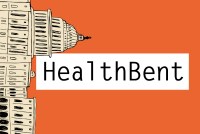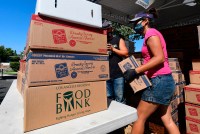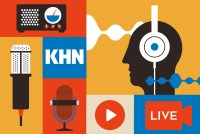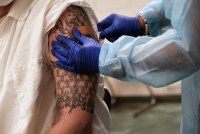Latest Morning Briefing Stories
Red State, Blue State, Twin Outbreak: Behind Wyoming and Colorado’s Anomalous Covid Spikes
Statistics show that Colorado residents are much more likely than Wyoming residents to be vaccinated against covid. Yet both Wyoming and Colorado were among the top 12 states with the highest covid case rates at the beginning of July. A closer look at a pair of similarly sized counties in those states helps explain why.
Biden Is Caught in the Middle of Polarizing Abortion Politics
The president, one of the last of a disappearing group of politicians who sought moderate compromises on abortion policy, is frustrating supporters. They wanted faster changes in federal rules. But abortion opponents — including Catholic bishops— are also taking him to task.
Government Oversight of Covid Air Cleaners Leaves Gaping Holes
Thousands of schools have spent millions of federal covid relief dollars snapping up air cleaning technology that claims to inactivate covid-19. But the devices fall into a regulatory gap.
Why We May Never Know Whether the $56,000-a-Year Alzheimer’s Drug Actually Works
It could take years for follow-up studies to prove Aduhelm slows the disease — or doesn’t. Meanwhile, its maker will profit.
California Takes a Nibble at Offering Food Stamps to Undocumented Immigrants
Food insecurity soared during the pandemic, including among unauthorized immigrants, who are not eligible for federally funded food stamps. California’s Democratic lawmakers want to expand the benefit to that population, but opponents cite the massive ongoing cost to the state.
Journalists Tackle Delta Variant, Hospital Prices and Public Health Spending
KHN and California Healthline staff made the rounds on national and local media this week to discuss their stories. Here’s a collection of their appearances.
Delta Variant Surges in Colorado as the Bands Play On
Mesa County is a breeding ground for the covid-19 delta variant, but few would guess with tens of thousands of people flocking to the state’s largest country music festival.
Most Inmates Have Had Their Covid Shots — But Their Guards Likely Haven’t
Hesitancy about the vaccines among prison staffers has led to a striking disparity: Inmates are better protected than corrections officials.
A Family Wellness Check: California Invests in Treating Parents and Children Together
The state will be the first to offer comprehensive counseling services to parents during pediatric visits as part of Medicaid.
As Covid Vaccinations Slow, Parts of the US Remain Far Behind 70% Goal
Vermont and Massachusetts lead the nation, with more than 70% of adults having had at least one dose of a covid-19 vaccine. Southern states like Tennessee lag far behind.














